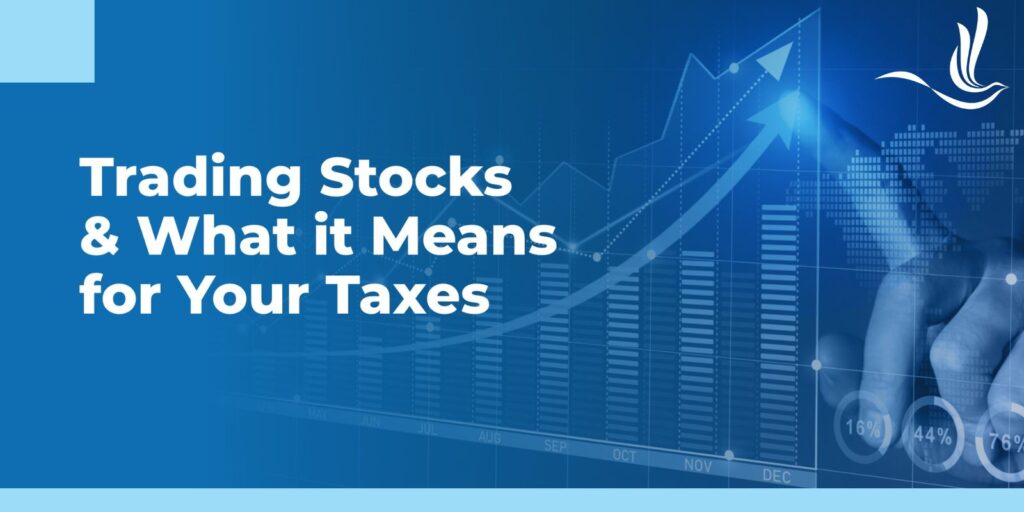
It’s a new year and with that may come new financial resolutions. One we hear often is the desire to learn to invest. Trading stocks can be a thrilling venture, providing investors with the opportunity to grow their wealth and achieve financial goals. However, it’s essential to understand that the gains and losses incurred in the stock market can have significant implications on your tax liability. Understanding what’s expected when you file can keep you out of trouble with the IRS. This article aims to shed light on the various ways stock trading affects your taxes and the key considerations to keep in mind.
Capital Gains and Losses
One of the primary tax implications of stock trading revolves around capital gains and losses. When you sell a stock for a profit, it results in a capital gain, and when you sell at a loss, it leads to a capital loss. These gains and losses can be categorized into two types: short-term and long-term.
Short-term Capital Gains Tax
This tax applies to profits from sold assets that were held for a year or less.
These are taxed at your ordinary income tax rate, which can be higher than the rate for long-term gains.
Long-term Capital Gains Tax
The long-term variant of this tax applies to sold assets held for longer than a year. The rates are 0%, 15%, or 20% depending on your filing status and taxable income. It’s important to note that long-term capital gains tax rates are usually lower, so it may work in your best interest to hold that stock for a little longer.
The long-term capital gains tax rates for tax year 2023 are as follows:
- Single filers with taxable income up to $44,625: 0% capital gains tax rate
- Single filers with taxable income between $44,626 and $492,300: 15% capital gains tax rate
- Single filers with taxable income over $492,300: 20% capital gains tax rate
- Married couples filing jointly with taxable income up to $89,250: 0% capital gains tax rate
- Married couples filing jointly with taxable income between $89,251 and $553,850: 15% capital gains tax rate
- Married couples filing jointly with taxable income over $553,850: 20% capital gains tax rate
How Dividends Affect Taxes
There are two types of dividends and they’re usually considered taxable income, qualified and nonqualified. Qualified dividend rates range from 0%, 15%, or 20% (the same rule for long-term capital gains tax). Nonqualified dividends are ordinary dividends that have the same tax rate as your income bracket. Taxpayers in higher brackets typically pay more taxes on dividends. Overall, dividend investments can drastically alter your tax bill.
Wash Sale Rule
The wash sale rule is an important consideration for investors looking to minimize their tax liability. According to this rule, if you sell a stock at a loss and repurchase a substantially identical security within 30 days before or after the sale, the loss may be disallowed for tax purposes. This rule prevents investors from selling a stock to realize a loss for tax purposes and then immediately buying it back.
Day Trading and Business Expenses
For individuals engaged in day trading as a business, expenses related to trading activities may be deductible. This can include costs such as trading platform fees, education expenses, certain types of interest, and home office expenses if trading from home. However, the IRS has specific criteria for qualifying as a trader. For example, the amount of time spent trading, holding periods, and more can help the IRS distinguish between day traders and investors. It’s crucial to meet those criteria to claim these deductions.
Reporting Requirements
Properly reporting your stock trades is essential to avoid potential issues with the IRS. Form 1099-B, provided by your broker, details your capital gains and losses. You may also need Form 8949, Sales and Other Dispositions of Capital Assets. It’s crucial to accurately report this information on your tax return, including any adjustments or additional documentation required for specific situations.
How to Reduce Taxes on Stocks
- Long-Term Capital Gains Tax: Ensuring your gains are taxed as long-term can greatly reduce your taxes on stocks. If possible, you should hold onto your assets for a little longer than a year. Long-term capital gains tax rates are often lower when you sell your stocks.
- Tax-Loss Harvesting: Offset capital gains by strategically selling investments that have incurred losses. This practice, known as tax-loss harvesting, allows you to use capital losses to offset capital gains, thereby reducing your overall tax liability.
- Use Tax-Efficient Investment Vehicles: Certain investment vehicles, such as index funds and exchange-traded funds (ETFs), are known for being tax-efficient. They typically generate fewer capital gains distributions compared to actively managed funds, potentially reducing your tax exposure.
- Understand Dividend Taxation: Be aware of the tax implications of dividend income. Qualified dividends are taxed at lower rates than ordinary income. Consider investing in stocks that pay qualified dividends to take advantage of these lower tax rates.
- Consult with a Tax Professional: Tax laws are complex and subject to change. Consulting with a qualified tax professional or financial advisor can provide personalized advice based on your specific financial situation and goals.
Tax Help for Stock Traders
While stock trading offers the potential for financial gains, it’s important to be aware of the tax implications associated with these activities. Understanding the rules regarding capital gains, the wash sale rule, dividend taxation, business expenses, and reporting requirements can help investors navigate the complex landscape of stock trading and ensure compliance with tax regulations. Seeking advice from tax professionals or financial advisors is advisable to optimize your tax strategy and make informed decisions in the dynamic world of stock trading. Optima Tax Relief is the nation’s leading tax resolution firm with over a decade of experience helping taxpayers with tough tax situations.
If You Need Tax Help, Contact Us Today for a Free Consultation